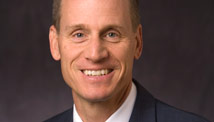Road tax alternative: Pay for each mile you drive

- Obama called for private investment for projects that benefit the economy
- Geddes: Public-private partnerships can build efficiently without increasing deficit
- Many states allow private investment in transportation infrastructure, he writes
- Investors could profit from "open road" tolling, which charges drivers for each mile traveled
Editor's note: R. Richard Geddes, associate professor of policy analysis and management at Cornell University, is the author of "The Road to Renewal: Private Investment in U.S. Transportation Infrastructure" (American Enterprise Institute, 2011).
(CNN) -- In his State of the Union address, President Obama promised to put Americans to work rebuilding the nation's crumbling infrastructure. That's a wonderful goal, but I'm most impressed with how he proposed to pay for it -- by "attracting private investment" and choosing projects based on "what's best for the economy, not politicians."
This is not hollow speechmaking or an impossible dream.
Broadening the use of public-private partnerships in transportation projects can build new roads, bridges, and tunnels quickly and efficiently without adding to the federal deficit.
PPPs can bring private capital and new jobs to struggling communities. But perhaps most significantly, they remove politics from the equation.
PPPs empower motorists by allowing them to become consumers, not merely users, of our nation's roadways. As consumers of transportation, Americans have tremendous power -- the power to demand the facilities and the services they need.
 Obama on jobs: 'The rules have changed'
Obama on jobs: 'The rules have changed'
 State of the Union address highlights
State of the Union address highlights
 State of the Union: A graphical recap
State of the Union: A graphical recap
In a public-private partnership, a private investor assumes responsibility for financing, designing, building, and operating a transportation facility.
Because private investors shoulder upfront costs -- as well as the considerable risk that their investment might fail -- they have strong incentives to make sure projects are completed on time and on budget. In a government-funded roadway, that cost and risk are borne by taxpayers.
Investors also stand to profit from PPPs -- that's why they invest in the first place -- so it's in their interest to attract motorists through efficient operation, rigorous safety standards, and fast, thorough repairs.
PPPs by nature have a customer-service ethic that government-operated roadways lack.
Private investors profit from PPPs primarily through toll revenue. Tolls, though not generally popular, are the key to revitalizing America's transportation infrastructure, because toll revenue can be used to leverage enormous amounts of private capital.
Private capital, as Obama acknowledged Tuesday night, is the only feasible way to thoroughly renovate and expand the nation's transportation system. Even if government could allocate resources fairly and oversee projects efficiently -- and Alaska's "bridge to nowhere" suggests strongly that it cannot -- public funding will never be deep enough to finance the infrastructure we need.
Higher taxes and more government spending will not advance our foundering transportation system; they will only mire it further.
More toll-funded roads wouldn't necessarily mean more toll plazas clogging our highways. Advanced satellite tracking technologies allow "open road" tolling, in which motorists would be charged per mile of road used -- just as consumers are charged per kilowatt hour for electricity, per gallon of water, or per minute of cell phone use -- without the backup at the toll booth. Private investors have the resources to utilize this new technology.
Another critical benefit of tolls is that fees can be adjusted to reduce congestion. If traffic congestion can be compared to water flowing through a sink drain, then a congestion toll is like the handle on the spigot -- it increases during times of peak road use, decreases during off-peak times, and is adjusted in real time to keep traffic flowing smoothly.
Congestion tolling saves motorists an enormous amount of time that would otherwise be spent stuck in traffic, thereby reducing stress, saving fuel, and making trip times much more predictable.
But the key benefit of congestion tolling is its positive impact on the environment. Auto emissions are significantly higher in heavy traffic; less congestion, therefore, means less carbon dioxide and fewer pollutants.
Although PPPs are not new to America, they remain underused as an engine for transportation infrastructure investment.
--R. Richard Geddes
Investors have financed major infrastructure projects in other industries for decades -- including natural gas, electricity, cable television, railroads, and telecommunications.
Currently, 29 states have enacted legislation enabling private investment in transportation infrastructure, but the number of PPP-operated projects remains small.
We need greater public education about the economic and environmental benefits of PPPs, and we need federal action to encourage states' use of private investment in transportation projects.
Obama got it right Tuesday night.
The nation needs massive investment in its transportation infrastructure. But that investment must come from the private sector, not from the government.
Because they are market-driven, PPPs transcend partisan wrangling and place control of America's roadways in the hands of motorists as consumers.
And because they are profit-centered, PPPs are more likely than government projects to be efficiently operated and well maintained.
With Congress set to renew the federal transportation bill in 2011, we must keep PPPs at the center of our dialogue on transportation policy.
To bolster the vitality of our infrastructure, the strength of our economy, the health of our environment, and the quality of our lives, America's roadways need the power of private investment, now more than ever.
The opinions in this commentary are solely those of R. Richard Geddes.







